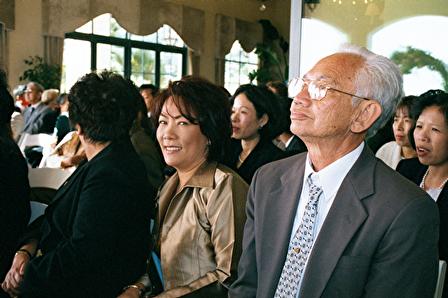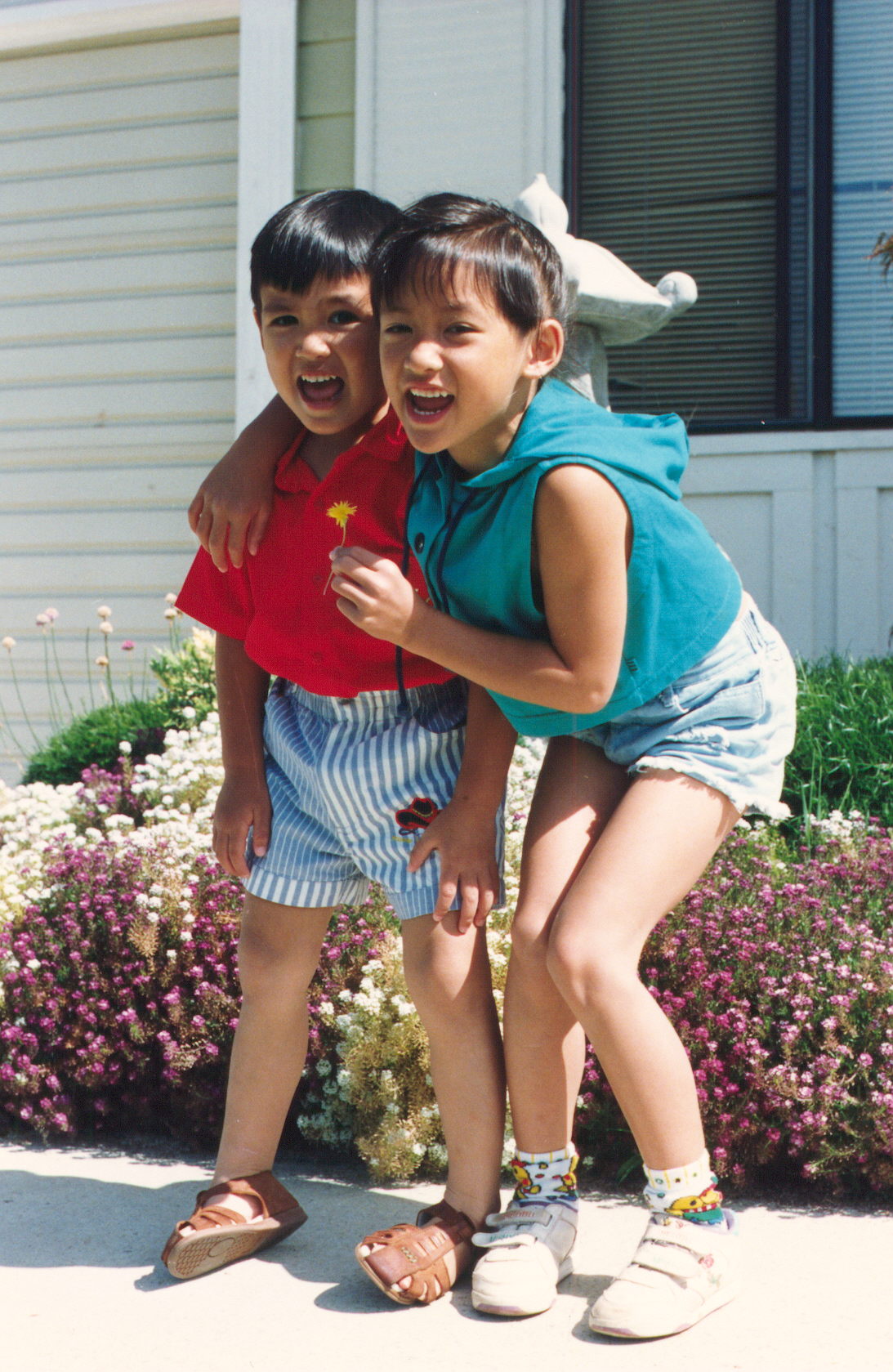Samey Pol Pot: The Pol Pot Era By Thida B. Mam
My experiences during Samey Pol Pot (the Pol Pot Era) are not unique. Any survivor of the Cambodian Holocaust could share an equally horrific and sad story. As one of my countrymen so aptly said, 'It will take a river of ink to adequately describe the horror of our experience during the Pol Pot Era.'
Unknown to the populace in 1975, Pol Pot, Ieng Sary and their wives, Ta Mok, Nuon Chea, Khieu Samphon and a handful of cohorts followed their master plan to create a socialist utopia. Their seemingly noble goal, however was thrust upon us, the Khmer people, with no information about their ultimate goals and without our consent.
When the Khmer Rouge came to power, I was a fifteen year old school girl who cared little about politics and blindly trusted that Pol Pot and others wanted what was best for the people, that they'd fought the corrupted central government in order to fix what was wrong in our society. My first encounter with the Khmer Rouge was one of hostility, deception and violence. At gunpoint, the Khmer Rouge soldiers ordered all of us to leave our homes and abandon the city -- supposedly to escape being bombed by the Americans. We were confused and intimidated, and so, with no apparent compelling reason to resist their orders, we became a nation of homeless refugees overnight. By the time we realised that leaving the city had been a trick to strip us of our homes and our possessions, it was too late to resist. In a matter of days we'd become totally dependent on the Khmer Rouge for rice, for information, for our very survival.
Pol Pot, Ieng Sary and the others exploited our desire for peace after years of upheaval and civil war. We thought we wanted peace at any price, but we had no concept then that the price would be the destruction of all we held dear: our families, our culture, our sense of worth, our beautiful land, our lives.
When people were told that we could return to the countryside and help produce food, my family chose to go to our ancestral village, where as a young child, I'd spent many happy summers playing with cousins whose families still farmed there. From 1970 to 1975 we'd been unable to visit our relatives becuse ofthe war, so I looked forward to seeing my cousins again.
Two of my cousins eagerly helped me learn to farm and adapt to life under the new regime. Another cousin was a Khmer Rouge soldier, but he made a great effort to tell me how to be a good Khmer by the Khmer Rouge's definition. However, my fourth cousin had been effectively indoctrinated by the Khmer Rouge. He saw me as a useless person, a parasite, who needed to be reformed. He preached communist ideology to me endlessly. An honest, loyal comrade, dutiful to his communist teachings, he really believed the Khmer Rouge would bring about a good life with equality for all. He had devoted his life and soul to that cause. Two years later he and and his family of eleven people were murdered by those he'd faithfully served for so long. His crime? He had the misfortune to have been born to parents defined as 'Rich Farmers Who Exploited the Peasants,' although they were little more than peasants themselves.
Every year, the rice planting season was followed by the killing seasons. The Khmer Rouge ordered the relocation of thousands of families. Very few families were truly relocated to clear new land. Most ofthe trucks and ox carts containing these people were driven to mass graves in jungle clearings and deep wells.
In the killing season of 1978, a village leader rode his bike into the cotton plantation where I worked next to his fifteen-year old niece. He blandly told her that Angka Loeu ('The Organisation') needed to relocate her and her mother. As he peddled away with her on his bike, I knew, she knew, and he knew that she and her mother would be exterminated. A day later two girls from the another work crew were taken away by a horse cart by her village leader. I became so paranoid that I could not breathe when I saw any of the village leaders around. I dared not make eye contact with any leaders as if it could invite them to come to me and tell me that it was my turn. In the hot sun, I worked quietly and did not want to see anything around me or to hear any 'request'. I sprayed the insecticide on the cotton plants and watched the worms squirm, blacken and die, I felt hollow. I heard a faint voice calling for a girl who was working near me. It was her mother. We could not see her well against the sun, but her thin hand signalling her daughter to come with her. A day later, when I was eating lunch, my friend whispered to me that the girl, her mother, one sister and two brothers had committed suicide. They hung themselves from a mango tree which stood on the road to my village after they had learned that their names had been 'called by Angka'. Thereafter, my knees be- came weak each time I walked past the mango tree to reach my home.
A week later, my village leader came for my friend who slept next to me. As he walked her out, I felt relief that it was not me, but I felt so guilty that her death spared me for another day. A rumour arose a few days later that she was brutally raped before she died. I could not stand it, so I stole some poi- son that was used to kill insects in the field and kept it in my pocket. I was so afraid, not afraid of death because I did not want to live, but how much will it hurt before I died or that I may have to witness my mother's torture before our death. As the warm rain poured on me I was thankful as I had a chance to cry without getting caught by the Khmer Rouge. The phantom of suffering and death haunted me then and still haunts me now in my nightmare.
Many American friends, on learning of my past ask, 'Who are the Khmer Rouge? Why did they hate Cambodians? Where are they from?' I feel shame every time I have to explain that the word 'Khmer' is what the people of Cambodia are called. Although those monsters have a twisted ideology, they share the same blood as their victims. They are our own people. Somehow we created them, and Khmers have yet to fully under- stand how and to wonder if we are still doing it. I tell my friends a saying in my language which describes the Khmer Rouge: 'Dong Kov Cheag Pi Sacig Aagn,' - 'the worms from our own skin.' Our Cambodian nightmare continues because we do not know how much shame we should bear for having such brutal kin.
Whenever I think of the past, incredible pain washes over me and I'm thrust back to that era, reliving the terror as keenly as the day it happened. Everyday,in sad times or in triumph, my mother whispers, 'If only your father were alive...' It has been sixteen years since our escape, but I continue to live in fear that one day we will find out how my father was murdered. I don't know if my mother and I could stand it.
Most of us hate to talk about our painful past, so we try to bury it in order to be able to function on a day-to-day basis. In 1986, I visited cousins in France. Of their family of fifteen, only five survived. I asked how my aunt and other cousins died. Soon we were crying so hard that we could not finish our conversation. Ten years later, this cousin and her sister visited us in America. Once again I asked how my relatives died. She said her mother and a sister died of starvation two days apart. Then she told of the fate of her brother-in-law who had his arms tied behind him with red cord and forced to walk to the fresh ditches where he was clubbed and kicked into the ditch. She told how she herself had been tricked into a forest to be raped then murdered, but escaped with the help of her sister. At this point we were so upset that we promised that we would never talk about this to each other again as long as we live. To relive our life under Pol Pot is just as bad as living it As I tried to prepare this paper, I had to agree to relive parts of this past. I wanted to describe one event in detail to bring you, even momentarily, into that world. I wanted to explain how I, as young girl, felt when the Khmer Rouge took my father away from me. I wanted to share the moment when I believed I would never feel happiness again, but how do you put such things into words? How do you explain a fear that swallows you like quicksand? For three days, so few words came into my head, but so many tears poured from my eyes.
We Khmer try to forget and yet we must not. Our agony will never lessen or our healing really begin until justice has been meted out to the handful of Khmer Rouge leaders who conceived and oversaw the destruction of a culture and carried out the genocide of a fourth of their own countrymen. They have never been brought to trial or punished for their heinous crimes of mass murder, torture, and the rape of a nation. We owe it to those who died, and we owe it even more to our children and to the people of the world to never let the knowledge of this terrible holocaust be forgotten. It was a crime not only against Cambodians but against all of humanity.
Recently, Ieng Sary, whose hands are as bloody as Pol Pot's, has been granted amnesty by Cambodia's King Sihanouk and the Royal Government. I was sick to learn the news and deeply troubled by it. I remember that twenty-one years ago, when I, along with most other Khmer, felt that peace for Cambodia was so precious that all of us should be willing to pay the price, no matter how high that price might be. However, we found out that the price we paid was so high that we still cannot describe it in words. Now, once again, all Khmer are being asked to swallow this cost of 'peace and reconciliation.' My head tries to understand that maybe it is worth the price. To save the living perhaps we must turn our back on the dead. But my heart cries and cries because it hurts so bad just to think that we are choosing to be gullible, to walk into the same trap again. Will we never learn? I don't want to add to the price we all paid twenty years ago for Ieng Sary's version of peace. There are some crimes and some leaders in this world so monstrous that amnesty simply cannot be granted by a civilized world.
If our current Khmer leaders are not willing to put their thirst for wealth and power aside and bring the Khmer Rouge leaders to justice, then we must plead with the good people of the world and the world court to hold them accountable by trying them for their crimes against humanity. The damage caused by granting amnesty to such a man is no different from having given amnesty to Hitler - unthinkable! Ieng Sary's pardon is an affront to the world. Such an act not only adds to the ongoing torture of victims like me, but it sets a precedent that other Khmer leaders of yesterday, today, and tomorrow need not fear reprisals for their deeds.
I dedicate this plea on behalf of my father and the millions of other victims of the Cambodian Killing Fields.
Thida B. Mam is now a US Citizen and an active member of the Cambodian community of San Jose, California, where she lives with her husband, daughter, and son.
This article is excerpted from David Chandler's forthcoming book, "Cambodia: Power, Myth, and Memory." This edited version originally appeared in "Called by Angka," a publication of the International Network on Holocaust and Genocide. The site administrators would like to thank Thida Mam, David Chandler, and David Young for permission to reproduce this article.
©1997 Thida B. Mam. Photo: Courtesy Thida Mam.
|




